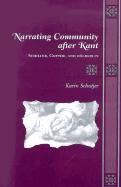- Start
- Narrating Community After Kant: Schiller, Goethe, and Holderlin
Narrating Community After Kant: Schiller, Goethe, and Holderlin
Angebote / Angebote:
Within the German tradition, the great promise of beauty is to link particular experiences within a conception of the whole. But this aesthetic promise has long been viewed as an "aesthetic ideology", even, by some, as a blueprint for fascism.Karin Schutjer challenges these familiar critical views by showing that classical German aesthetics gave shape to complex visions of social solidarity. Turning to pivotal philosophical and literary works from the late eighteenth century, she shows how the hopes and fears surrounding the French Revolution stimulated an imaginative rethinking of individual and collective identity -- one which can inform modern thinking about the possibilities and limits of community.Schutjer examines how the dualism of Kant's Critique of Aesthetic Judgement held promise for community by suggesting a whole originating in individual life and an individual life originating in the whole. She then explores how this paradoxical structure develops into complex narratives of community in Schiller's On Aesthetic Education, Goethe's Wilhelm Meister's Apprenticeship and Holderlin's, Empedokles, and shows how these writers stretch, adapt, and ultimately undermine this dualistic concept.Narrating Community after Kant makes an important statement about discourses on community in German intellectual culture around 1800, demonstrating that aesthetic community is always a work in progress while challenging those who invoke "community" as the foundation of permanent institutions. It sheds new critical light on these classical thinkers and shows how their ideas can serve as a rich resource for our own thinking about community. This book will prove insightful to students andscholars interested in German literary, philosophical, and cultural studies.
Fremdlagertitel. Lieferzeit unbestimmt

